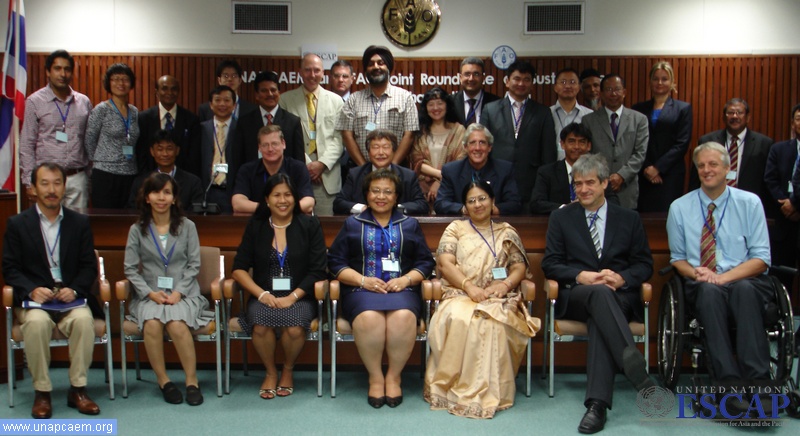Sustainable Agricultural Mechanization Roundtable: Moving Forward on the Sustainable Intensification of Agriculture 8-9 December 2011
 (BANGKOK 10 DEC, 2011). Agricultural mechanization is a key factor in the world’s ability to feed itself and rapid mechanization in agriculture has allowed the sector to keep up with the demands of population, particularly in the Asia-Pacific Region, despite the fact that the total labor force involved in agricultural activities is experiencing annual declines.
(BANGKOK 10 DEC, 2011). Agricultural mechanization is a key factor in the world’s ability to feed itself and rapid mechanization in agriculture has allowed the sector to keep up with the demands of population, particularly in the Asia-Pacific Region, despite the fact that the total labor force involved in agricultural activities is experiencing annual declines.
Thus far, however, current agricultural mechanization practices have increased pressure on fragile natural resources, such as increasing soil erosion and promoting overuse of chemical inputs, the latter seen in heavy utilization of synthetic nitrogen fertilizers in crop production typically resulting in significantly more nitrous oxide (N2O) [1] emissions from agricultural soils than that occurring from less intensive, low-tillage techniques. Mechanization also plays a role in encouraging farmers to open lands that currently serve as valuable forests and rangelands. In addition, the agricultural sector as a whole consumes more than 70 per cent of the world’s total fresh water resources.
In short, the margin of error in our actions to address rapid recourse depletion, yet feed more people than any time in the history of our planet, is narrowing rapidly. Coupled with increasingly erratic weather events, such as prolonged flooding and drought, the task ahead for the agricultural sector is daunting.
In response, the United Nations Asian and Pacific Centre for Agricultural Engineering and Machinery (UNAPCAEM) and the Food and Agriculture Organization of the United Nations held a Sustainable Agricultural Mechanization Strategies Roundtable 8 - 9 December at FAO’s Regional Office for Asia and the Pacific in Bangkok, Thailand. The Roundtable addressed the modalities in developing Sustainable Agricultural Mechanization Strategies (SAMS) that can enable countries to achieve the dual goals of intensifying agricultural production and achieving environmental sustainability. The latter is particularly important for the Asia-Pacific region, which is already beginning to face serious environmental challenges to maintain its agricultural production base. The Roundtable, which established a platform for increased substantive collaboration and tangible action on SAMS between FAO and UNAPCAEM, was attended by country representatives in the area of agricultural mechanization from Bangladesh, China, India, Indonesia, Malaysia, Myanmar, Philippines, Thailand, Sri Lanka, and Viet Nam. Key participation also included stakeholders from the private sector, donors, UN agencies and experts on agricultural mechanization strategies.
Mr. Hiroyuki Konuma, Assistant Director General and Regional Representative of FAO’s Regional Office for Asia and the Pacific opened the Roundtable stating “…the new paradigm of ‘sustainable production intensification’ recognizes the need for productive and remunerative agriculture that conserves and enhances the natural resource base and environment, and which positively contributes to the delivery of environmental services”. Further Mr. Konuma emphasized that the functionality of environmentally friendly agricultural management practices is highly dependent on suitable mechanization technologies.
Mr. LeRoy Hollenbeck, Head of UNAPCAEM, noted in his opening remarks that “…today’s environmental focus on agriculture includes energy efficiency; reduction in carbon and other gas emissions; use of flexible fuels; application of more sustainable agricultural practices, such as conservation and low-tillage agriculture; and more efficient and appropriate use of fertilizers and pesticides”.
Given the above, it is important to move toward environmentally mechanized sustainable agriculture and increase access to environmentally sound agricultural machinery that both sustains and enhances rural livelihoods and reduces pressure on natural recourses that are the lifeblood for producing food.
Ms. Erdenejargal Tumurbaatar, Director, External Cooperation Division, Ministry of Food, Agriculture and Light Industry of Mongolia suggested that “…undertaking a SAMS could be a way for Mongolia to avoid the mistakes that other countries had made in mechanizing their agricultural production in the past”.
Additionally, it is now increasingly important in the Asia-Pacific region to encourage sustainable, private sector development that can offer farmers a broader range of technology (including more environmentally friendly technology) choices at the right price to increase agricultural productivity, provide food security and reduce post-harvest losses.
Agricultural mechanization, in short, is a necessary component in the daunting task in feeding our planet. However, how mechanization is applied must be a key consideration toward sustaining rural livelihoods, sustaining natural resources necessary for the production of food, and our ability to pass on agricultural lands to future generations. Undertaking SAMS can trigger tangible action toward enabling a more resilient and environmentally sustainable agricultural sector that reconcile Millennium Development Goal 1 (MDG), to eradicate extreme poverty and hunger, with MDG 7, ensuring environmental sustainability.
Thus, SAMS is expected to serve as the foundation to create a policy, institutional and market environment in which farmers and other end-users have the choice of farm power and equipment suited to their needs within a sustainable delivery and support system, and produce food in a more resource efficient manner. With a clearer picture of the current status of mechanization in the Asia-Pacific region, countries would be better informed and equipped to develop, implement or reassess past mechanization strategies.
[1] Overuse of chemical inputs, such as heavy utilization of synthetic nitrogen fertilizers in crop production, typically results in significantly more nitrous oxide (N2O) emissions from agricultural soils than that occurring from less intensive, low-tillage techniques.
